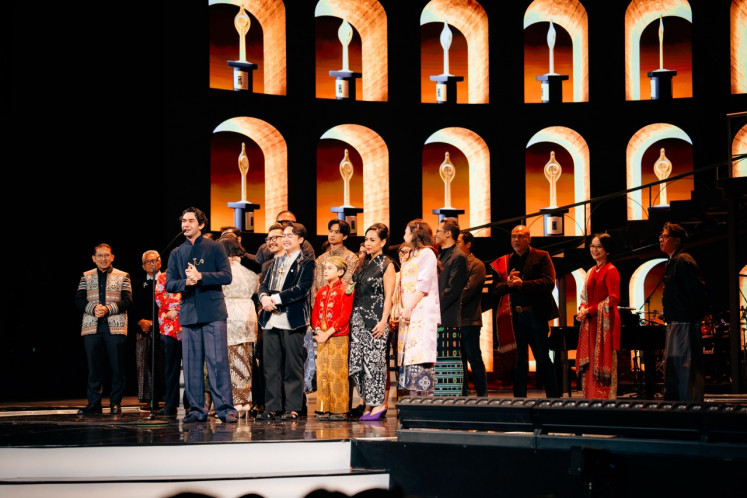Popular Reads
Top Results
Can't find what you're looking for?
View all search resultsPopular Reads
Top Results
Can't find what you're looking for?
View all search resultsEssay: Connect me. Connect me not.
We rely on our smartphones more than we do each other.
Change text size
Gift Premium Articles
to Anyone
"Sorry sir, the machine is not working.”
Those are the words that I often hear whenever I wish to top up my e-wallet at a typical convenience store in Jakarta.
Right, of course. By “machine”, the store clerk meant a point-of-sale (POS) device, which allows merchants to accept and process card payments.
To be fair, most of the time, these devices do work. The problem is usually the connection.
POS devices require either a broadband or Wi-Fi connection to process real-time electronic fund transfers. The lack of a reliable connection usually means the devices become … well, useless.
It is not unusual for me to be made to wait for up to five minutes simply to top up my e-wallet. Sometimes it takes longer than that. The thing is, convenience stores are supposed to be convenient — waiting in line for five minutes can seem like eternity. Not very convenient.
Ironically, Indonesia is working toward becoming a more digital, cashless society — “working” being the operative word here. We rely on our smartphones more than we do each other. We turn to our gadgets for entertainment, information and sometimes advice. We also pay for services rendered electronically.
A slew of digital payment services has also entered the market thanks to our quick adaptation to technology in the last two to three years. I mean, you get the idea. Yet we often forget that all of these amazing platforms and applications rely heavily on a good and reliable internet connection. This is our Achilles’ heel.
Despite the progress we’ve seen, Indonesia’s broadband and mobile infrastructure is not ready to support our dream to become a digitized society. Internet providers are still struggling to keep their connections strong and reliable, and mobile operators are lagging far behind. There is no guarantee that one can go a day without experiencing at least some internet connection issues.
Yet while we are accustomed to these issues, it doesn’t mean we should keep our expectations low.
Every day, we rely on the internet to carry out the simplest tasks.
I have friends who complained that because their mobile provider was down for the day (out of many days), they were unable to secure a ride to work in time.
Another friend of mine tried to top up their e-wallet, which runs under a specific ride-hailing app, but thanks to an unreliable connection, the transaction had an error patch halfway through.
Yet another friend was trying to pay for their ice cream using a new app-based digital service and failed because the POS device at the shop could not detect the connection and therefore was shown to be offline. Turned out, it had been offline for a while.
These are costly mistakes that merchants often have to reimburse with discounts and freebies. Case in point: At a popular coffeehouse chain, members receive free drink size upgrades whenever the store’s POS device is not working. Does it help reduce the risk of elevating the customers’ dissatisfaction level? Yes. Does it solve the issue? No.
Here’s the thing: We are facing a classic problem. Our dreams are bigger than the means we employ to execute them. We have this dream of being the kind of society we often see in sci-fi movies — embracing all kinds of high technology — yet we are still developing the most basic element of technology infrastructure.
Refusing to face the truth, we allow ourselves to get lost in a shared delusion of living in a futuristic world. We take the internet for granted, because it seems available all the time. When we lose the connection, we are left with mild confusion — which then leads to frustration.
To think that four years ago, most of us managed to get through our days without a constant internet connection. Today may feel light years away from 2014.
What solutions are there then? Well, mobile operators are constantly trying to reform their frequencies to accommodate faster speeds, yet none of them really want to work together to make this happen, leaving progress moving rather slowly.
We can’t really expect people to leave the online lifestyle either. This lifestyle is a sign toward an evolving, modern society. But for it to develop to everyone’s benefit, it has to function with a reliable internet connection.
For a tree to grow healthy, sturdy and leafy, the soil that feeds its roots must be properly maintained, watered and nurtured. Otherwise, you’re left with an unhealthy tree that disintegrates fast and easily when harsh winds blow.
Right now, the tree of digital society in Indonesia looks more like the latter, with many leaves but many of them dying quicker — with its trunks brittle and hollow. Not enough care or consideration is focused on the roots to ensure the trees grow healthy.
With 34 million internet users in Indonesia, the potential for a proper digital society is massive. But the ultimate responsibility falls into the hands of internet providers, which make up the roots of the tree.
Anyway, after the clerks told me they couldn’t get the machine running, I went for my backup plan, which was to go to the store’s ATM and top up my e-wallet there. I would also top up my phone credit at the ATM, or so I thought. Alas — “We are sorry. The machine is temporarily out of service.”











